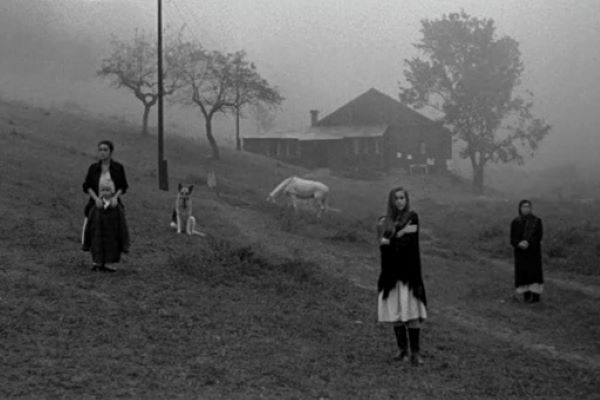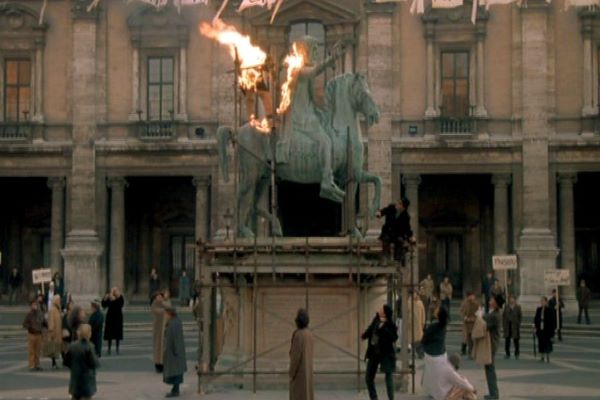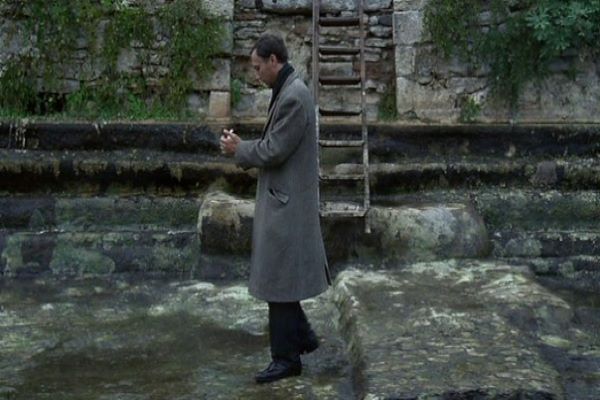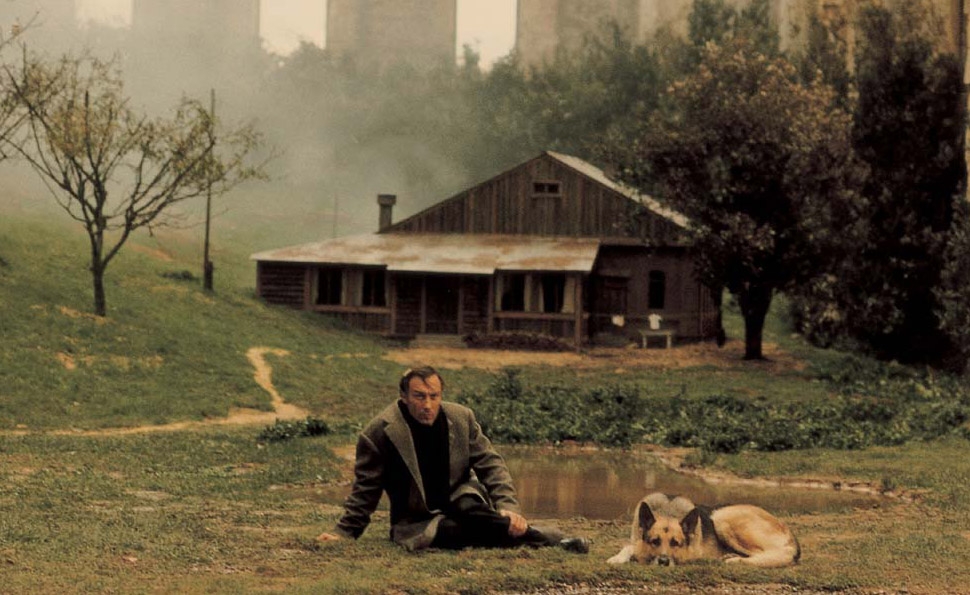Andrei Tarkovsky made his penultimate feature film Nostalghia in Italy. He was irritated by the constant supervision and pressure of the Soviet Censor Board. His creativity was being restricted to an unwanted limited boundary. So, Tarkovsky was not happy and content filming in Soviet Russia anymore. He set himself free and traveled to Italy. However, the infamous Russian nostalgia crept in and he deeply felt home-bound. The film is about the memories, dreams, and nostalgia of a Russian poet temporarily living in Italy. However, he does not know the specific time of his return to his motherland. Much like Tarkovsky himself, the poet sinks into deep nostalgia, alienation, and melancholia, and eventually dies in Italy. In his lifetime, he is not able to return to his beloved motherland again.
A Russian poet named Andrei Gorchakov (Oleg Yankovsky) travels to Italy to research the life of the 18th-century Russian composer Pavel Sosnovsky who spent a few years in Italy and committed suicide after returning to Russia. Andrei along with his beautiful interpreter Eugenia (Domiziana Giordano) travels to visit a convent in the hilly countryside of Tuscany in order to see the frescoes by Piero Della Francesca, but he changes his mind at the last moment and does not enter. Eugenia enters the convent and asks the priest why women are more devout than men. The priest replies that women are meant to have children and raise them with patience and sacrifice. Eugenia asks whether women are meant only for this purpose. However, the priest is not able to answer.

Andrei increasingly feels homesick and rejects Eugenia’s advances. In a beautiful dream sequence, he sees his wife, children, and dog down the foggy Tuscan hilly areas. His wife appears as the replica of Mother Mary. Andrei’s family members in the Russian countryside are merged with their imaginary existence in the Tuscan hills. He is deeply homesick and does not enjoy the rain. So, he lies down on the bed a little later in the dark hotel room. Andrei befriends an apparently lunatic man named Domenico (Erland Josephson) who locked his family members for seven years in order to save them from the end of this world. He is famous in the locality for trying to cross a hot spring pool with a lighted candle. He claims that he can save the world if he succeeds in crossing the pool with the lighted candle. Andrei takes him seriously and engages in a deep conversation with him inside his house during a heavy downpour. Domenico gives his candle to Andrei and asks him to cross the pool with the lighted candle.
Andrei is about to leave Italy for Russia when Eugenia calls him to bid goodbye and informs him that she has met Domenico in Rome. He asked her whether Andrei has crossed the pool with the lighted candle. Andrei says yes even though he has not crossed the pool yet with the lighted candle. Domenico delivers an emotional and high-voltage speech in which he appeals for universal brotherhood. However, he revisits the pool in Bagno Vignoni, which has been drained out recently, and he tries hard to keep his promise to Domenico. He repeatedly tries to cross the empty pool with the lighted candle. At last, he succeeds and dies.
In Nostalghia, Tarkovsky portrays the infamous Russian nostalgia that does not let Russians settle down in other countries. For this reason, historically, they have always been bad immigrants. They have never been able to completely get rid of the smell of their motherland. Life is not complete and content without the warmth of family members, relatives, close friends, and the very close association with the motherland. No matter how much we have grown up, our motherlands do not stop beckoning us, and it is very difficult to ignore that invocation. Sosnovsky too suffered from this. He deeply missed Russia and its people while staying in Italy. He mentioned in his letter to his friend Pyotr Nikolayevich – “I would die if I never returned to Russia. If I never again saw my homeland, the birches, the air of my childhood.”

Even though Tarkovsky shot Nostalghia in Italy and the story is set in Italy, the film profoundly is a Russian film. Even though it involves Italian locations, the soul of the film is Russian. The protagonist of the film Andrei neither is able to concentrate on his research work nor can enjoy his stay in the hilly Tuscan countryside of Italy. He deeply suffers from homesickness and dreams of his family and the magnificent natural beauty of the Russian countryside. His body may be in Italy but his soul definitely is in Russia. Tarkovsky wanted to portray the nostalgia and melancholia of Andrei.
In Nostalghia, Tarkovsky wanted to portray the alienation of a Russian man who is alienated not only from the world but also from himself. Andrei is so isolated that he can’t express himself fully to his interpreter Eugenia who is very close to him. However, he has a significant philosophical awakening as well as consciousness. When everyone believes that Domenico is a lunatic, Andrei believes his words and tries to save him. He keeps his promise to Domenico and crosses the pool with the lighted candle in order to save the world. An alienated individual only can feel the pain of another alienated individual with significant spiritual awakening.
Tarkovsky was always interested to depict such types of people in his films who look weak from the outside but are utterly charged up inside. Apparently, they do not appear as heroes but can sacrifice themselves for bigger causes and the well-being of society. They refuse to adjust pragmatically and limit themselves within a defined set of boundaries with fake morality. Domenico exactly falls in that category. He tells Andrei – “We need bigger ideas. I was selfish, so I wanted to save only my family, but everyone must be saved, the entire world.”

In Nostalghia, Tarkovsky questions the so-called patriarchal mentality that deems women as merely birth machines. Even the esteemed priests and bishops hold the same opinion. Eugenia asks the priest in the Church – “Why are women more devout than men?” The priest replies – “A woman is meant to have children and raise them with patience and self-sacrifice.” Eugenia asks again – “That’s all she is meant for?” The priest replies – “I don’t know.” Tarkovsky holds women on such a high pedestal that in the dream sequences, Andrei’s wife and Mother Mary get merged into one woman as if all the women in this world are nothing but the replicas of Mother Mary.
The central theme of all Tarkovsky’s films is the spiritual fulfillment of humans. Nostalghia is not an exception. Andrei is alienated, in terrible shape, and suffering from a spiritual crisis. Andrei crosses the pool with the lighted candle and then dies. But, why does he die? does he die only because of illness? When a man loses faith and conviction in himself, he loses the meaning of his life, and there is nothing left in him apart from death and madness.
The last shot of the film establishes Tarkovsky’s mastery as an artist as well as a filmmaker. In this shot, Tarkovsky brings the magnificent Russian countryside inside the Italian abbey church of Saint Galgano. This acts as a metaphor to portray Andrei’s current state of mind. Despite staying in Italy, his heart is filled with the memories and dreams of his motherland. At this moment, his life is divided and confused, which bars him from spiritual fulfillment. Through this constructed image, Tarkovsky depicts the divisions and confusions within humans as a whole and Andrei is not just a separate example.
One of the most important parts of Nostalghia is Domenico’s speech in Rome. As part of his speech, he invokes equality, inclusion, and universal brotherhood, and he strongly condemns discrimination. For the bigger causes of society and the world, he does not step back from immolating himself. He does not shy away from the supreme sacrifice to make this world a better place. Society may refer to him as a lunatic, but he emerges as a hero. He says – “There are no great masters left. That’s the real evil of our time. The heart’s path is covered in shadow. We must listen to the voices that seem useless. We must fill the eyes and ears of all of us with things that are the beginning of a great dream. If you want the world to go forward, we must hold hands. We must mix the so-called healthy with the so-called sick. Freedom is useless if you don’t have the courage to look us in the eye, eat, drink, and sleep with us.”
Nostalghia is largely devoid of any dramatic plot apart from a very few instances like the conversation between Andrei and Eugenia, Domenico’s speech in Rome, and Andrei’s repetitive attempt to cross the pool with the lighted candle. The screenplay, which is written by the famous Italian screenwriter Tonino Guerra and Tarkovsky himself, mostly contains philosophical and spiritual dialogues. All the signature styles of Tarkovsky like long takes, slow camera movement, and multiple track shots are in full bloom in the film. Almost all the shots appear as dreams. The scenes wherein Tarkovsky remembers his family members down the hilly Tuscan countryside are shot so beautifully by cinematographer Guiseppe Lanci that they look exactly like a dream.
There are moments in the film when Eugenia, the filmmaker’s wife, and Mother Mary appear as a single character. Tarkovsky always had a deep faith in Orthodox Christianity. Cinematographer Guiseppe Lanci plays with lights and shadows in multiple scenes. When Eugenia enters Andrei’s room, at first, she appears in the darkness, and then her face is lit. The scene when Andrei closes himself in the hotel room during the heavy downpour is largely covered in shadows. The foggy Tuscan hilly areas look magical. Beethoven’s ninth symphony resonates with the scenes when Andrei visits Domenico’s house and Domenico delivers a philosophical, emotional, and very important speech in Rome. Even though Nostalghia is generally not considered Tarkovsky’s best film, it surely is his most personal.
